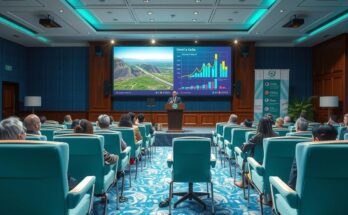The UAE is in talks with Israel and the US about rebuilding Gaza but insists on unfulfilled conditions. Key prerequisites include reforms in the Palestinian Authority, a new credible leadership, and a commitment from Israel towards a two-state solution. Despite informal discussions, consensus has not been reached, and the UAE remains cautious about its involvement.
The United Arab Emirates (UAE) has engaged in discussions with Israel and the United States regarding its potential involvement in postwar Gaza rehabilitation. However, UAE officials indicated that their conditions for participation remain unmet. Israeli Prime Minister Benjamin Netanyahu has praised the UAE, along with Saudi Arabia and others, as vital players in post-conflict governance. Yet, the UAE has firmly stated its refusal to partake in any initiative perceived as legitimizing an Israeli presence in Gaza.
An official from the UAE confirmed that while informal talks have been ongoing, no consensus has been reached regarding the preconditions necessary for their involvement. These requirements involve a formal invitation from a new and credible Palestinian Authority (PA) prime minister, meaningful reforms within the PA, Israel’s explicit commitment to a two-state solution, and clear leadership from the United States. The UAE has been an advocate for significant reforms within the PA, which faces widespread allegations of corruption.
Furthermore, recent reports suggest that there may have been conversations about utilizing private contractors as peacekeepers in Gaza, although the UAE official refrained from commenting on this. The UAE’s relations with Israel have been stable since the 2020 Abraham Accords, highlighting an enduring partnership despite ongoing conflicts.
The discussions between the UAE, Israel, and the United States revolve around the reconstruction of Gaza following the ongoing conflict. The UAE has shown interest in contributing to rebuilding efforts but maintains strict conditions that must be acknowledged. Concerns regarding governance and legitimacy are pivotal, particularly in light of the Palestinian Authority’s leadership issues. The geopolitical dynamics of the region emphasize the importance of collaboration among these nations, especially considering the recent peace agreements.
In conclusion, the UAE’s willingness to aid in the reconstruction of Gaza hinges on specific prerequisites that emphasize governance reform and commitment to peace initiatives. While dialogue continues with Israel and the United States, the lack of alignment on these conditions may hinder the UAE’s potential role in postwar Gaza recovery efforts. The broader implications of these discussions point to the complexities of Middle Eastern geopolitics and the search for lasting stability in the region.
Original Source: www.wral.com




